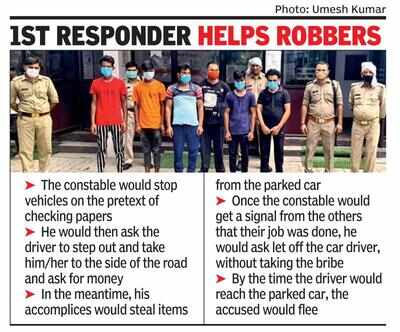
Ghaziabad: A UP Police Dial 112 constable, who helped a gang rob people on NH9 after stopping their vehicles on the pretext of checking, was arrested along with his associates late Monday night.
The constable, Praveen Kumar, and his associates, Vinay, Deepak, Pradeep, Himanshu, Roshan and Kunal, are all residents of Ghaziabad.
Police said the constable used to stop vehicles, ask the driver to alight and take the person 100 metres away from the car for a ‘settlement’ if documents were not in order or any other irregularity was found. The other gang members would then steal valuables from the car. Their modus operandi came to light after a complaint was filed by one of the victims at the Vijay Nagar police station.
Devendra Bisht, SHO, Vijay Nagar police station, said that on September 9, the constable stopped a person named Rajesh, a man attached to an online pharmacy company who was on his way to Gurgaon to make a delivery.
“Around 7pm, Praveen stopped his car for checking and asked him to show the papers. The victim showed his company’s ID card but Praveen told Rajesh that he was driving at a high speed and that a challan would be issued to him. A discussion went on for a few minutes. The constable sat in the car and took the victim some 200 metres away, towards Vijay Nagar bypass,” Bisht said.
“Praveen then came out of the car and called Rajesh out. They started walking down the road and the constable asked for a bribe to let him go. In the meantime, Praveen’s associates reached the car, stole medicines worth Rs 4-5 lakh that were kept inside and fled. The constable then let off Rajesh, without taking any money, and left the spot as well,” he added.
Police sources said Rajesh had been asked for a bribe of Rs 14,000.
During interrogation, Bisht said Praveen told them that after forming the gang, he and associates had carried out similar robberies and would often target people travelling alone. Praveen has been terminated from his job with Dial 112, the statewide first-responder service of police.
All the accused have been booked under IPC Section 379 (punishment for theft) and sent to judicial custody after being produced in court.
The constable, Praveen Kumar, and his associates, Vinay, Deepak, Pradeep, Himanshu, Roshan and Kunal, are all residents of Ghaziabad.
Police said the constable used to stop vehicles, ask the driver to alight and take the person 100 metres away from the car for a ‘settlement’ if documents were not in order or any other irregularity was found. The other gang members would then steal valuables from the car. Their modus operandi came to light after a complaint was filed by one of the victims at the Vijay Nagar police station.
Devendra Bisht, SHO, Vijay Nagar police station, said that on September 9, the constable stopped a person named Rajesh, a man attached to an online pharmacy company who was on his way to Gurgaon to make a delivery.
“Around 7pm, Praveen stopped his car for checking and asked him to show the papers. The victim showed his company’s ID card but Praveen told Rajesh that he was driving at a high speed and that a challan would be issued to him. A discussion went on for a few minutes. The constable sat in the car and took the victim some 200 metres away, towards Vijay Nagar bypass,” Bisht said.
“Praveen then came out of the car and called Rajesh out. They started walking down the road and the constable asked for a bribe to let him go. In the meantime, Praveen’s associates reached the car, stole medicines worth Rs 4-5 lakh that were kept inside and fled. The constable then let off Rajesh, without taking any money, and left the spot as well,” he added.
Police sources said Rajesh had been asked for a bribe of Rs 14,000.
During interrogation, Bisht said Praveen told them that after forming the gang, he and associates had carried out similar robberies and would often target people travelling alone. Praveen has been terminated from his job with Dial 112, the statewide first-responder service of police.
All the accused have been booked under IPC Section 379 (punishment for theft) and sent to judicial custody after being produced in court.
Quick Links
Kerala Coronavirus Helpline NumberHaryana Coronavirus Helpline NumberUP Coronavirus Helpline NumberBareilly NewsBhopal NewsCoronavirus in DelhiCoronavirus in HyderabadCoronavirus in IndiaCoronavirus symptomsCoronavirusRajasthan Coronavirus Helpline NumberAditya ThackerayShiv SenaFire in MumbaiAP Coronavirus Helpline NumberArvind KejriwalJammu Kashmir Coronavirus Helpline NumberSrinagar encounter
Get the app

